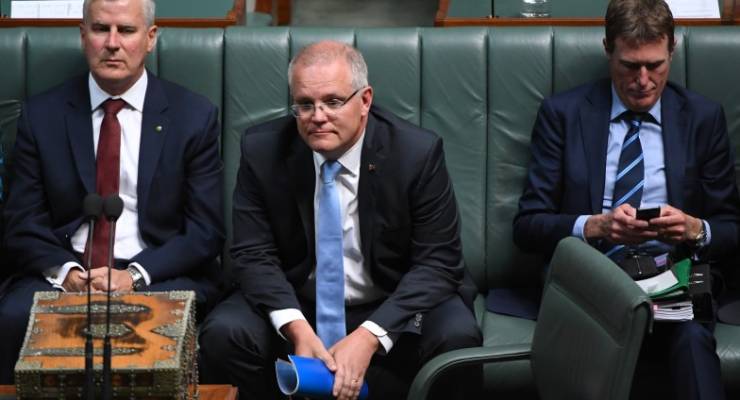
The government’s commitment to locking Australia in place has led to a low-growth, low-productivity economy dependent on public spending and commodity price spikes to prop it up. But beyond the economy, the government’s goal has been to prevent Australia from going anywhere across a number of major policy areas.
Run by climate denialists and the representatives of fossil fuel interests, the government, apart from a brief effort by Malcolm Turnbull, has worked to prevent any action that might reduce Australia’s carbon emissions. No matter how hard the government tries to hide the data, emissions have risen steadily since Tony Abbott removed the effective, efficient carbon pricing scheme the Coalition inherited from the previous government. Even now, with some of its own most conservative elements lamenting the impact of climate change on agriculture, and talk of northern Australia becoming “uninsurable” as the climate emergency starts to bite, the government refuses to contemplate any action beyond regularly lying about meeting our international commitments and devising ways to vilify climate protesters.
The relentless focus on the status quo is also the basis for what is now a point blank refusal to progress any constitutional recognition of Australia’s first people, let alone agree to a treaty with them — the most recent recognition effort, led by Ken Wyatt, was derailed within days, humiliating the nation’s most senior Indigenous politician. As a result, Australia remains the only colonial settler society other than Israel that refuses to formally acknowledge that it was founded on dispossession. This is despite elements within its own ranks, often in the unlikeliest of places, calling for real recognition and an Indigenous voice to government, of the kind dismissed out of hand and maliciously mischaracterised as “a third chamber”.
The same template applies to energy policy, more egregiously even than other areas. The government’s only policy is a determination to protect a dinosaur coal sector at all costs, freezing Australia in amber rather than accept the need for decarbonisation. The result — also partly blameable on the states, especially those that delayed privatisation of their generators — has driven up prices for businesses and consumers, deterred much-needed investment, and left the east coast energy network at risk of failure.
While this wilful stagnation panders to special interests, it also reflects a profound laziness. This is a government that routinely runs out of things to do in parliament when it sits (and it will sit just 13 weeks this year), that devotes as much time to devising policies to wedge its opponents as it does to addressing issues of substance, that insists all is well with the economy even as the central bank pleads for assistance, and that asked its leading economic think tank to advise on productivity reforms only to entirely ignore the resulting advice.
This is a government that has learnt the wrong lesson of conservatism. Its policies suggest it believes that conservatism is about doing nothing; that conservatism is an end, not a means, not a philosophy of considering change guided by what has worked in the past and by the institutions that have served the community and the polity over generations.
Australia thus stagnates along with its lazy government. Its workers and households face a decade without income growth and a low-productivity future. Its children face a poorer, more chaotic life on a cooking planet, and are vilified when they protest. Its expensive energy sector teeters on the brink of failure every summer. Its Indigenous peoples face years — decades — without the most basic recognition of their existence and history, while continuing to endure a vast gap in life outcomes and opportunities with non-Indigenous Australians.
By 2022, when the next election is due, a lost decade will be in sight, in which Australia as an economy and as a nation has marked time. With a shell-shocked and timid opposition, further lost years beckon beyond that, deep into the next decade, a country doing nothing, going nowhere.
This is the second part of Bernard Keane’s analysis of a stagnating Australia. Read his first story here.








Crikey is committed to hosting lively discussions. Help us keep the conversation useful, interesting and welcoming. We aim to publish comments quickly in the interest of promoting robust conversation, but we’re a small team and we deploy filters to protect against legal risk. Occasionally your comment may be held up while we review, but we’re working as fast as we can to keep the conversation rolling.
The Crikey comment section is members-only content. Please subscribe to leave a comment.
The Crikey comment section is members-only content. Please login to leave a comment.